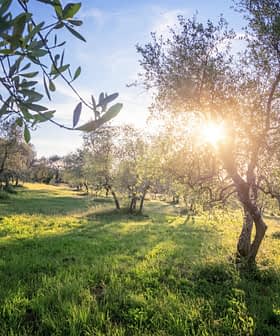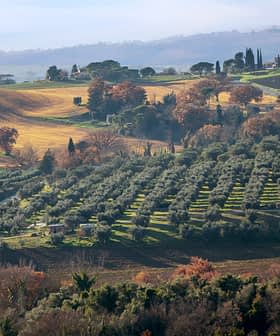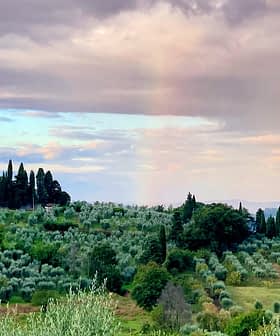A Rise in Sustainability Marketing in the Olive Oil Sector

The number of press releases promoting sustainable practices in the olive oil sector has been increasing, reflecting a broader trend of businesses focusing on sustainability marketing strategies to improve brand image and increase sales. Companies like Deoleo and Pompeian are implementing sustainability initiatives, such as introducing sustainably sourced labels and receiving certifications for sustainable practices, in response to consumer demand and to align with their values and stakeholders.
One thing that is never in short supply for the editor of any publication is the steady flow of press releases from companies or entities seeking to promote a new product or initiative.
In recent years, the number of press releases sent to Olive Oil Times touting the sustainable practices or sustainability initiatives of olive oil producers of all sizes appears to have increased steadily.
Companies that do better on sustainability management, generally, just do better on management. It’s always been a really good proxy for that.
“Every sector’s talking about sustainability more,” Andrew Winston, a sustainable business strategist and advisor, told Olive Oil Times.
In a 2021 article published in Harvard Business Review, Winston argued that “no business leaders seriously doubt that sustainability should be on the agenda.”
See Also:Europe Cracks Down on Eco-Labels in Effort to Curb GreenwashingWinston told Olive Oil Times that from his experience, this has been especially true in the consumer products and food industries.
“Younger consumers want to know where it [the product] came from, who made it and were those people paid a living wage,” he said.
While there is no quantitative data about sustainability marketing in the olive oil sector, a range of surveys and studies show that businesses of all types are focussing more on sustainability, and consumers are responding.
According to a July 2022 survey of 1,000 companies in the United Kingdom, Belgium, Germany, Spain and France, nearly one-third of respondents said they already spend more on sustainability marketing campaigns than normal ones.
Additionally, 74 percent said they would increase spending on sustainable marketing in the next few years. Only 1.3 percent said their spending would likely decrease in that period.
The survey also asked why the companies invested in sustainable marketing strategies. Nearly 21 percent of respondents said they did so to improve their brand image, while 18 percent said they hoped to increase sales.
Only 14 percent of respondents said they were investing in sustainable marketing strategies because they believed with was the right thing to do.
Evidence of increasing spending on sustainability marketing comes from a separate consumer survey from Simon-Kucher & Partners, a consultancy. It found that 71 percent of respondents had experienced modest or significant changes in their purchasing behavior in the past five years toward more sustainable options.
Marketing officials at some of the world’s largest olive oil producers and sellers appear to have seen the research, taking advantage of the many sustainability bona fides of olive oil production.
In May, Deoleo, the world’s largest olive oil bottler, launched part of its new sustainability strategy, introducing “sustainably sourced” and “original sustainable” labels to its flagship brands, Bertolli and Carapelli.
According to the company, bottles of olive oil bearing these labels come from the groves and mills following the company’s sustainability protocol and are bottled in recycled plastic.
Sustainability has been top of mind at Deoleo for a while. In a 2021 interview with Olive Oil Times, the company’s chief executive, Ignacio Silva repeatedly emphasized that ensuring the industry’s sustainable supply of olives and olive oil is the most significant challenge.
Winston, who advises a range of food and consumer goods companies, said implementing sustainability strategies is good for business and worth initial investments.
“It creates value for businesses,” he said. “The benefit to businesses of even just tracking [sustainability] means they know their supply chain better. They understand it better. They can make better choices.”
“Companies that do better on sustainability management, generally, just do better on management,” Winston added. “It’s always been a really good proxy for that.”
Along with the potential to improve the bottom line in the long run, Winston said that sustainability marketing serves as a vehicle for companies to tell a story to the consumer about who they are and what they value.
Pompeian, one of the world’s largest olive oil producers, is doing just that. The company said it recently became the first olive oil producer to receive SCS Global Service’s sustainably grown certification for its olive groves in California.
“We’ve been around since 1906, and we’ve been dedicated to quality and acting as a responsible olive producer, manufacturer and distributor of olive oil,” Mouna Aissaoui, Pompeian’s executive vice president and chief operating officer, told Olive Oil Times.
“This was just a logical step for us as we continue our mission that we want others to eat, live and feel better,” she added.
According to Paula Lopes, Pompeian’s vice president of sustainability, quality and research and development, the company implemented practices to improve biodiversity on its olive farms by promoting autochthonous plant cover and protecting pollinators.
“We are the first [SCS Global Services] certified company in the United States, and currently, we are the only one certified worldwide,” she told Olive Oil Times. “Our plan is 50 percent of all of our farmers will become certified by 2026, and this figure will reach 100 percent by 2030.”
Aissaoui acknowledged that Pompeian had noticed an increasing demand for sustainably-produced extra virgin olive oil but said the initiative had more to do with the company’s values and stakeholders.
Pompeian is 100 percent farmer-owned, and Aissaoui said the company’s century-old mission is to protect the places where it farms olives and produces olive oil.
According to a meta-analysis of 42 articles published in peer-reviewed journals studying the effects of sustainability labels on consumer behavior, olive oil labels focusing on economic sustainability resulted in the highest willingness to pay.
“Consumers are willing to pay premium prices for most of those labels, which contribute to farmers’ income guarantee, market remuneration, producers’ minimization of risks and position with respect to the market,” the researchers wrote.
The researchers also found that ‘organic’ labels had the highest added value impact of the environmentally-focused sustainability labels.
“Most consumers, independently of their locations, valorize olive oil carrying an organic label and are willing to pay more for this attribute,” they wrote.
While Winston said that there is little evidence that suggests consumers are willing to pay more for sustainable products, he believes businesses try to communicate what they are doing to improve their sustainability because they think it matters to their consumers and stakeholders.
“If they’re doing this and sending these press releases, they believe it matters to somebody,” he said.
Aissaoui said Pompeian promotes sustainable agriculture based on the sector’s need to mitigate the impacts of climate change, which are becoming increasingly prevalent across the olive-growing world.
“It [sustainability] has to become just the way that we work, and although we recognize it’s going be a very long-term project, we also recognize the benefit of working this way and creating a new market segment [for sustainably-produced olive oil],” she said.









